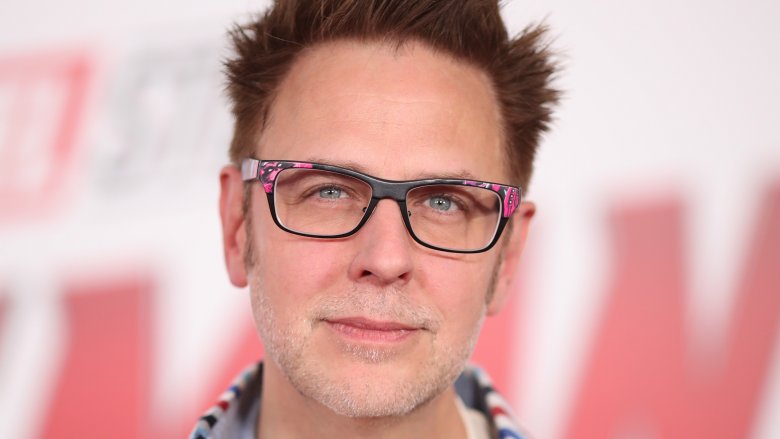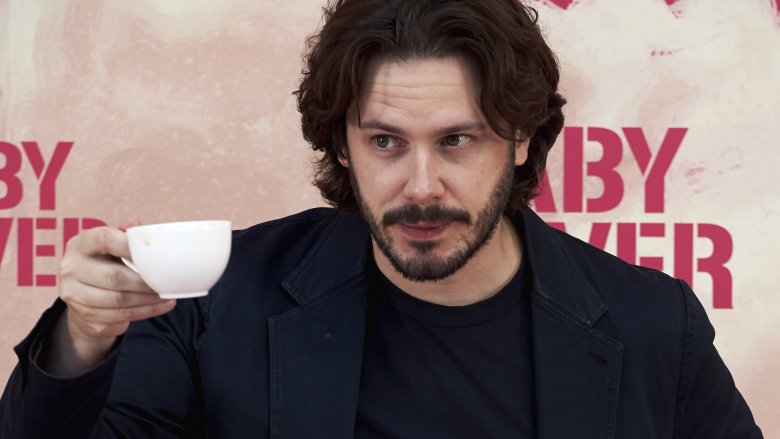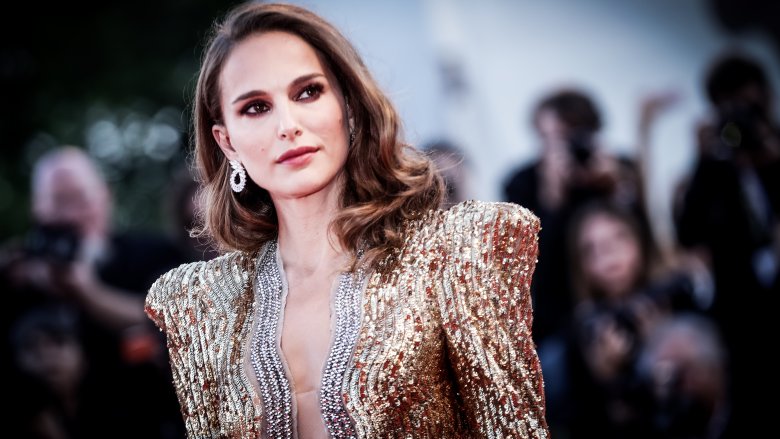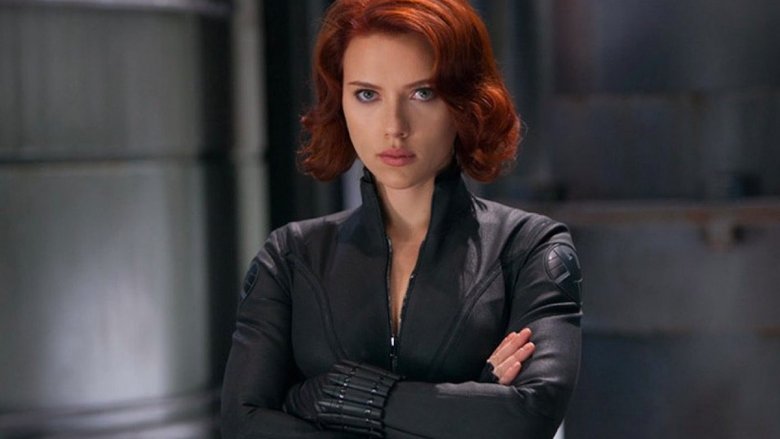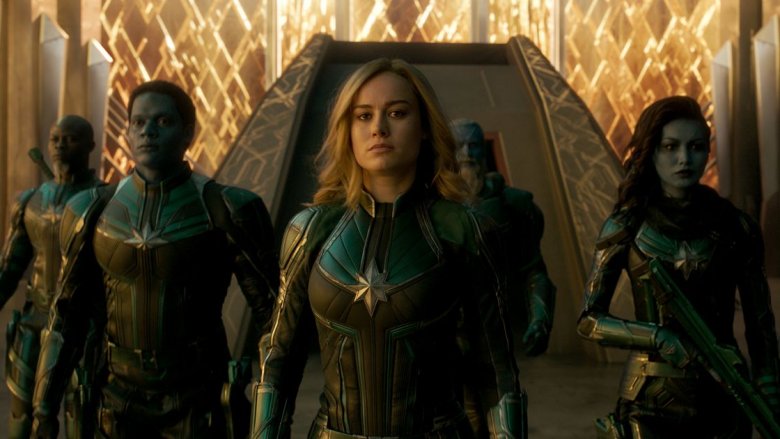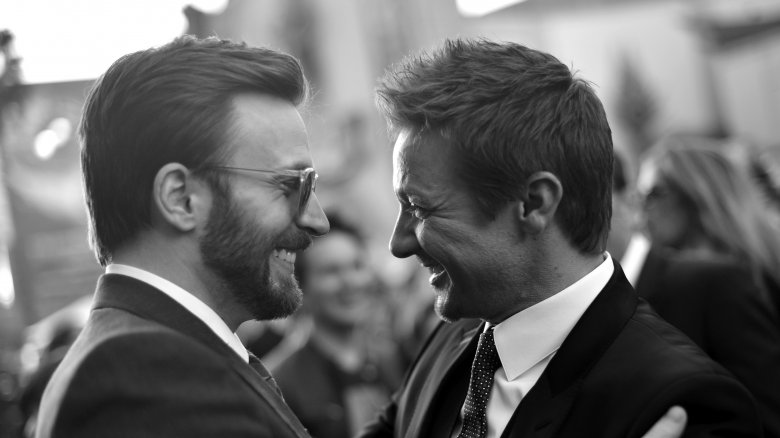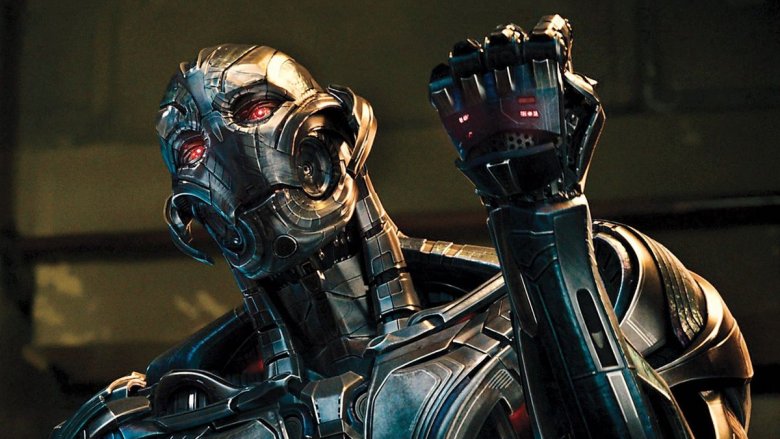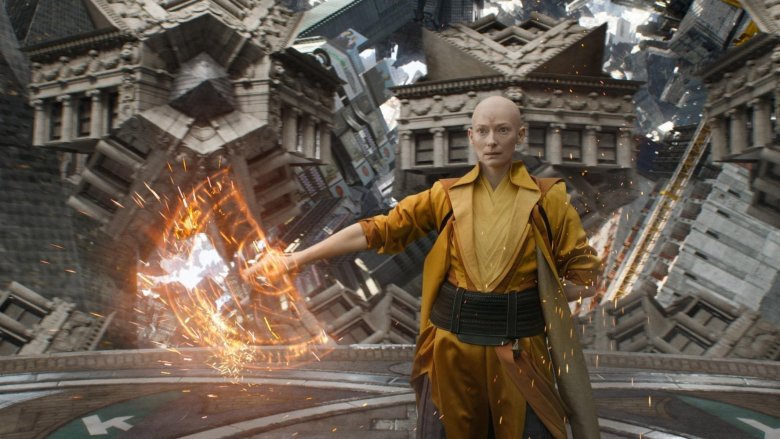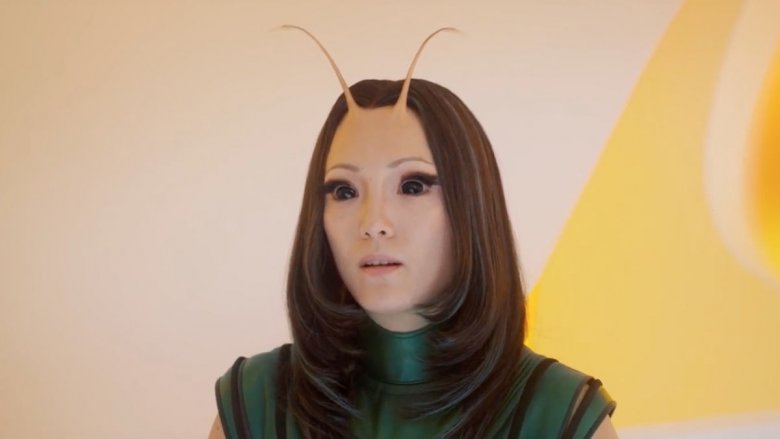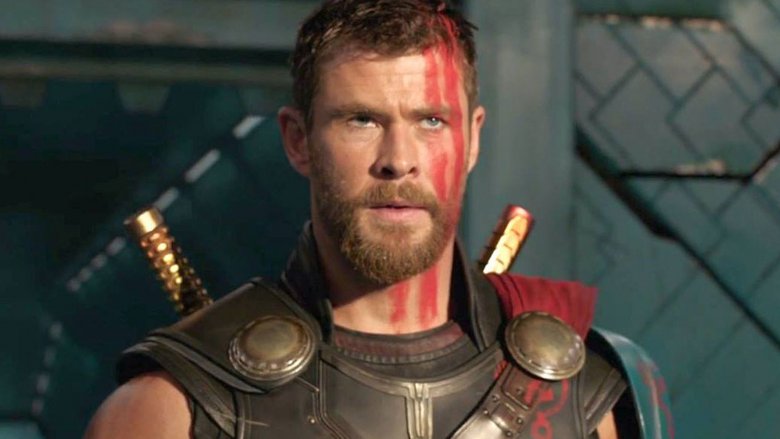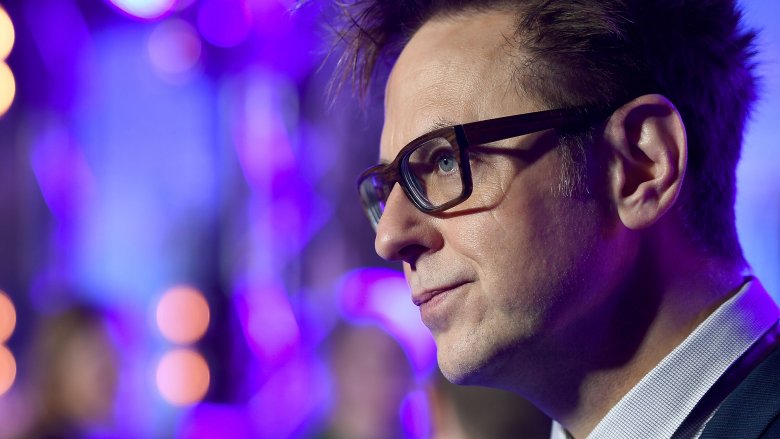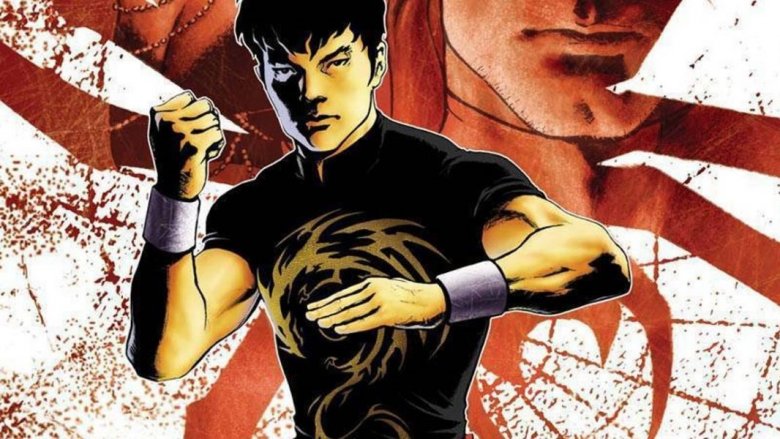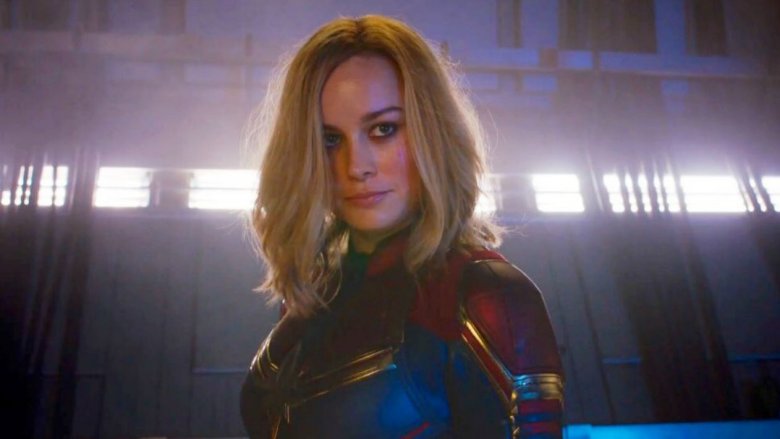The Biggest Scandals To Ever Hit Marvel Movies
The Marvel Cinematic Universe is the most successful film franchise of all time. Its films have won critical praise, Academy Awards, and universal acclaim from fans. The series has turned B-level heroes like Iron Man and Captain America into icons on the level of Batman and Superman, and it's made superstars out of actors like Robert Downey Jr., Tom Holland, and Michael B. Jordan.
For a franchise that's being going for over 10 years, the MCU has been relatively free from the drama often associated with big Hollywood projects. There haven't been any directors accused of sexual assault, there haven't been any major stars who've walked away, and none of its films have been dumpster fires. But that's not to say the MCU is squeaky clean. Despite its success, the studio has faced some serious controversies that angered fans, upset actors, and more. From distraught directors to crazy conspiracy theories, these are the biggest scandals to ever hit Marvel movies.
Dealing with directors
Marvel Studios makes amazing movies, but it's fair to say most of them feel pretty similar. Sure, every so often, a director will put a unique stamp on their film, but for the most part, Marvel Studios has a tone they want for all their films. And if a director sees things differently, she might not be around for long.
The MCU has been involved in a couple public spats with high-profile directors. Most recently, Ava DuVernay walked away from Black Panther, saying she declined the project because "it really wasn't going to be an Ava DuVernay film." Patty Jenkins also had her fair share of issues when it came to dealing with Marvel. She was hired to do Thor: The Dark World, but after just two months she made the "painful and sad" decision to leave the sequel, as Marvel wasn't interested in the story Jenkins wanted to tell.
Perhaps the most infamous example of Marvel and a filmmaker clashing heads is the sad story of Edgar Wright (above). The English auteur had been attached to Ant-Man since 2006, but as Wright explained on Variety's Playback podcast (via AV Club), "I wanted to make a Marvel movie, but I don't think they really wanted to make an Edgar Wright movie." After the studio decided to rewrite the script without him, Wright said so long to the MCU in 2014. It was a disappointing departure and proof that no filmmaker can stray too far from the MCU style.
Arguing with actors
For the most part, actors really enjoy working on Marvel projects, but while Chris Evans and Chris Pratt seem pretty happy, not everyone has enjoyed their time with the Avengers. According to The Hollywood Reporter, Natalie Portman really wanted Patty Jenkins to direct Thor: The Dark World, so the actress got quite upset with the studio when they parted ways with the filmmaker. Portman stuck around for the film anyway due to contractual obligations, but she was quickly written out of the franchise with a throwaway line in Thor: Ragnarok. As to whether Portman would ever return to the MCU, the actress told the Wall Street Journal, "As far as I know, I'm done."
Mickey Rourke was also irate with the studio after Iron Man 2. Rourke wanted to flesh out the character of Ivan Vanko (aka Whiplash) and worked to create a more complex character. But according to Rourke, Marvel producers cut almost all of that out, leaving us with a far less interesting character. Of course, the most infamous examples of Marvel arguing with actors is how the studio treated the original Bruce Banner (Edward Norton) and the first James "Rhodey" Rhodes (Terrence Howard). While both men are notoriously difficult to work with, it seems they were cut from the franchise over money issues. For all the joy Marvel brings audiences, sometimes it leaves actors with quite a bit of heartbreak.
Where's all the female merchandise? - Ike Perlmutter Part 1
When Guardians of the Galaxy came out in 2014, there wasn't a lot of Gamora merchandise. And when Avengers: Age of Ultron hit theaters, Black Widow merchandise was almost impossible to find. The situation was so bad that Mark Ruffalo actually called Marvel out on it. When it came to merch (T-shirts, costumes, accessories), female superheroes just weren't getting any respect, and it's largely thanks to Isaac "Ike" Perlmutter.
Back in the day, Perlmutter was the CEO of Marvel, and he was in charge of everything: movies, TV shows, and publication. By all accounts, Perlmutter wasn't the biggest fan of diversity. In fact, he was adamantly against making female merchandise, saying it wouldn't sell. It was so bad that when Shane Black wanted to make Maya Hansen (Rebecca Hall) the main villain of Iron Man 3, Marvel brass said no way, claiming nobody would ever buy her toy. (Those Aldrich Killian action figures, on the other hand, were just going to fly off the shelves like hotcakes, right?)
Needless to say, Marvel fans were pretty incensed by Perlmutter's misogyny, but his outdated opinions were bad for the company in more ways than one...
Marvel's diversity problems - Ike Perlmutter Part 2
These days, the MCU is a decently inclusive place, with films like Captain Marvel and Black Panther. But things haven't always been so welcoming around Marvel Studios with Isaac "Ike" Perlmutter in charge. It took over a decade for Marvel fans to get a female-led movie, and it seems Perlmutter was responsible for the delay. During the Sony Pictures hack, some of the Marvel CEO's emails were leaked, revealing he was dead-set against women crime-fighters. In his email, he cited films like Electra and Catwoman as definitive proof that female heroes couldn't make money. (On a completely unrelated note, Captain Marvel made almost $1 billion, cough cough.)
This wasn't the only time Perlmutter was caught making controversial statements. When Don Cheadle replaced Terrence Howard in Iron Man 2, the CEO said nobody would notice because ... ugh ... black people "look the same." So once again, it's easy to see why it took so long for Marvel to make a movie led by a black superhero. Fortunately, in 2015, there was a major reorganization inside Marvel. Disney changed Perlmutter's from CEO to Chairman of Marvel Entertainment. More importantly, while Perlmutter is still in charge of the company's publications and TV shows, producer Kevin Feige was given full control of Marvel Studios (the filmmaking branch of the company). And when you look at how amazing Phase 3 has been, it's easy to see how Perlmutter was both offending fans and holding the MCU back.
Evans and Renner insult Black Widow
Tony Stark is a notorious womanizer, and everybody thinks that's awesome. Steve Rogers is dating his dead girlfriend's niece, and nobody really cares. But the moment Natasha Romanoff smiles at more than one guy, she's labeled a "slut" by the very dudes who should know better.
In the lead-up to Avengers: Age of Ultron, Chris Evans and Jeremy Renner were doing an interview with Digital Spy when the subject of Black Widow came up. In the MCU, Black Widow (Scarlett Johansson) works alongside multiple male heroes and has close friendships with both Hawkeye (Renner) and Captain America (Evans). She's never romantically involved with either of them, although some fans like to speculate about possible superhero sexy time — scenes that are never implied in the movies.
But when word got out that Natasha actually was somehow involved with Bruce Banner (Mark Ruffalo) in the upcoming film, Digital Spy asked Evans and Renner what they thought about Black Widow's relationships with the three aforementioned male characters. That's when Renner dropped the "s-word," and Evans said the female hero was "a complete whore." Obviously, this did not sit well with the fan base, and after a huge outcry, Evans and Renner published apologies in Entertainment Weekly. Come on, guys, we expected better from you.
The Age of Ultron debacle
While Avengers: Age of Ultron has a lot going for it — James Spader as a sassy, psychotic robot is perfect — the movie was hit with multiple controversies. For example, somebody thought it was a good idea to have Tony Stark make a rape joke. And then there was the Black Widow debacle. During the film, the black-clad hero calls herself a monster after saying she was forcibly sterilized at a school for assassins. This sent shockwaves through the fanbase as many were furious that Widow would consider herself a monster for not being able to have children, and the outrage was so severe that it allegedly drove director Joss Whedon off Twitter.
But this wasn't the only incident that gave Whedon headaches. The Marvel brass kept forcing him to alter the notorious scene where Thor goes spelunking for info on the Infinity Stones. Whedon was so frustrated with the changes that he wanted to cut the scene, but Marvel said if he did that he would also have to lose the scene where the Avengers arrive at Hawkeye's farm. The studio also allegedly wanted him to drop the scenes where our heroes are under the spell of Scarlet Witch. The back-and-forth drama resulted in a very messy movie, and even though Mark Ruffalo would beg Whedon to stay in the franchise, the director reportedly said he'd never direct a Marvel movie again.
Whitewashing Doctor Strange
Bringing Doctor Strange to the big screen was always going to be a challenge, thanks to The Ancient One. In the comics, this Sorcerer Supreme was more like a Sorcerer Stereotype: an elderly, mysterious Asian man who gives his secrets to an inexperienced white dude. What worked on the page in the 1960s wasn't going to fly on the screen in 2016. So director Scott Derrickson considered turning The Ancient One into an Asian woman. But as he explained to The Daily Beast, he soon realized that he'd stumbled into yet another stereotype, saying that when he "envisioned that character being played by an Asian actress, it was a straight-up Dragon Lady." By "Dragon Lady," Derrickson was referencing an old-timey racist character type who's "a domineering, powerful, secretive, mysterious Asian woman of age with duplicitous motives." And since that perfectly describes The Ancient One, he changed his mind about picking an Asian actress.
Instead, Derrickson turned The Ancient One into a Celtic woman played by Tilda Swinton, but by avoiding a racist stereotype, he was also getting rid of an Asian character. As a result, critics and fans were upset by the whitewashing, wishing Derrickson had actually gone with an Asian actor or actress. In fairness, Derrickson wasn't trying to be malicious — quite the opposite — and he has expressed regret for upsetting so many people. Still, the character of The Ancient One is so problematic that there was no winning with this one.
Being mean to Mantis
When Guardians of the Galaxy Vol. 2 soared into theaters, most fans were pleased with the sci-fi installment. However, not everyone was enamored with Vol. 2, especially when it came to the character of Mantis. In the comics, Mantis is a feminist icon, a powerful psychic, and formidable warrior who has defeated the likes of Thor, Iron Man, and Black Panther. This woman can hold her own with Marvel's best, but that's obviously not the version we got in the James Gunn film. Played by Pom Klementieff, the MCU Mantis is timid and fearful. On top of that, she's constantly referring to a white guy as "master," and some have argued this plays into racist stereotypes about Asian women being submissive.
Making things worse, some critics thought the film was just too mean to Mantis. A lot of the jokes in Vol. 2 come at Mantis' expense, with Drax (Dave Bautista) constantly saying she's ugly and disgusting. While this is intended for a laugh — Klementieff is obviously gorgeous — some people worried the jokes about a woman's looks were insensitive and might send a negative message to young girls who are constantly bombarded with harmful ideas about their appearance. Bloggers and critics aren't the only ones unhappy with the MCU Mantis. As Steve Englehart, who co-created the comics character, put it, "I was not happy with Mantis' portrayal. That character has nothing to do with Mantis."
Disney declares war on the L.A. Times
Love 'em or hate 'em, film critics are an essential part of the Hollywood machine. They impact the conversation surrounding a movie and can define a film's legacy. So unless they're dreading bad reviews, movie studios usually allow critics to view advanced screenings of their films. That way, good reviews can build buzz and get people excited before a movie hits theaters.
But in 2017, Disney laid the hammer down, refusing to give an advanced screening of Thor: Ragnarok to the Los Angeles Times. (The House of Mouse owns Marvel Studios.) So what motivated Disney to keep the Times out of Asgard? Well, the paper had published a series of stories on the relationship between the movie studio and the city of Anaheim, California, where Disney is based. According to the Times, Anaheim gives the company an insane amount of perks, and Disney has even tried to influence the city's elections.
Obviously, Disney wasn't crazy about this kind of scrutiny, and while it never denied the stories were true, it enacted a ban against the newspaper, starting with Thor: Ragnarok. However, the ban only lasted four days, as pretty much every journalist in the U.S. banded together to fight the studio. Multiple critics organizations refused to consider Disney films for awards, and outlets like the Washington Post and the New York Times said they wouldn't attend Disney events. So in the end, Disney rescinded the ban, ending a battle of superhero proportions.
The James Gunn controversy
Perhaps the most notorious scandal to ever hit the MCU, the James Gunn controversy started in 2018, when a group of right-wing Twitter users delved into the director's Twitter feed. They unearthed a series of controversial tweets about rape and pedophilia, and while Gunn meant them as jokes, they weren't at all funny. This revelation prompted Disney to fire Gunn from the Guardians of the Galaxy franchise, which turned the Marvel world upside-down.
Twitter erupted over Gunn's firing, and the cast of Guardians — which includes actors on both sides of the political spectrum — all stuck up for Gunn, signing a petition asking Disney to hire him back. Gunn himself profusely apologized for the tweets, saying he'd changed as a person over the years and no longer made such provocative "jokes." Others pointed out the folks who brought down Gunn were probably less worried about his inappropriate tweets and more interested in silencing a high-profile critic of President Donald Trump.
But wanting to avoid controversy, Disney stuck by its guns and refused to bring Gunn back ... all the way until 2019. The House of Mouse had searched for someone to place the director but to no avail. And then news broke that Gunn had been hired by DC to write and direct a Suicide Squad sequel. Shortly afterward, Disney rehired Gunn to finish his sci-fi trilogy. It was an unprecedented move for the company, and while some fans were disappointed, most were elated to see Gunn back in charge of Guardians.
Shang-Chi stirs up strong feelings
When it comes to Asian representation, the MCU has been a tad lacking. But in 2019, the company changed that by announcing its first-ever Asian-led film: Shang-Chi. Introduced in 1973, Shang-Chi is a Chinese hero and martial arts expert, but his complicated past is stirring up controversy in China.
In the comics, Shang-Chi works for his father who turns out to be a pretty diabolical dude. In fact, he's one of the most famous villains in history: Fu Manchu. This dastardly bad guy first debuted in the 1910s, courtesy of British author Sax Rohmer. And unfortunately, the character is incredibly racist. He's a white-hating Chinese mystic who played on fears of the "Yellow Peril." These days, there's no way you could put Fu Manchu on the silver screen, so when the news of a Shang-Chi film made its way to China, people simply weren't having it.
According to the South China Morning Post, Marvel fans took to Weibo — China's version of Twitter — to voice their frustrations about a character with such racist roots. However, Deadline has reported the Shang-Chi story will be heavily updated for modern sensibilities. So here's hoping Fu Manchu will completely disappear, and the filmmakers will figure out a way to make Shang-Chi's origins far less offensive.
Captain Marvel stirs up stupid conspiracy theories
Brie Larson was the perfect choice for Captain Marvel. The Oscar-winning actress imbued Carol Danvers with determination, empathy, and a great sense of humor. But when Marvel announced Larson was joining their star-studded team, internet trolls started freaking out. YouTube videos and angry tweets accused Larson of hating white men, claimed she was ruining the MCU, and encouraged people to see Alita: Battle Angel instead of Captain Marvel. And all this misplaced hate came about because trolls were taking something Larson said completely out of context.
In February 2019, Larson noted that press junkets were dominated by male white journalists, and in an interview with Marie Claire, she said she wanted to see more female reporters and critics of color attend press events. All she was asking for was a little diversity, and somehow, the trolls twisted her words into hating white men, a sentiment that Larson has never expressed. These trolls then did their best to manipulate the film's audience score on Rotten Tomatoes before the site shut them down.
Needless to say, this manufactured controversy did absolutely nothing to stop Captain Marvel's success. The film has made almost $1 billion, although that's sparked a completely insane conspiracy theory that it was playing to empty theaters and Disney was fudging the numbers. Some trolls hate women so much that they're making up stories crazier than anything Marvel has ever done.
